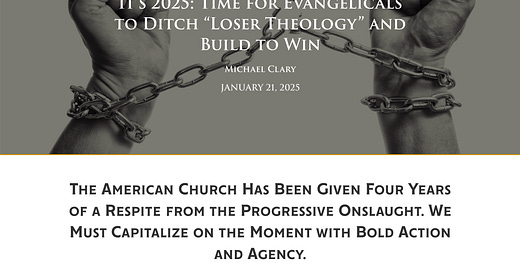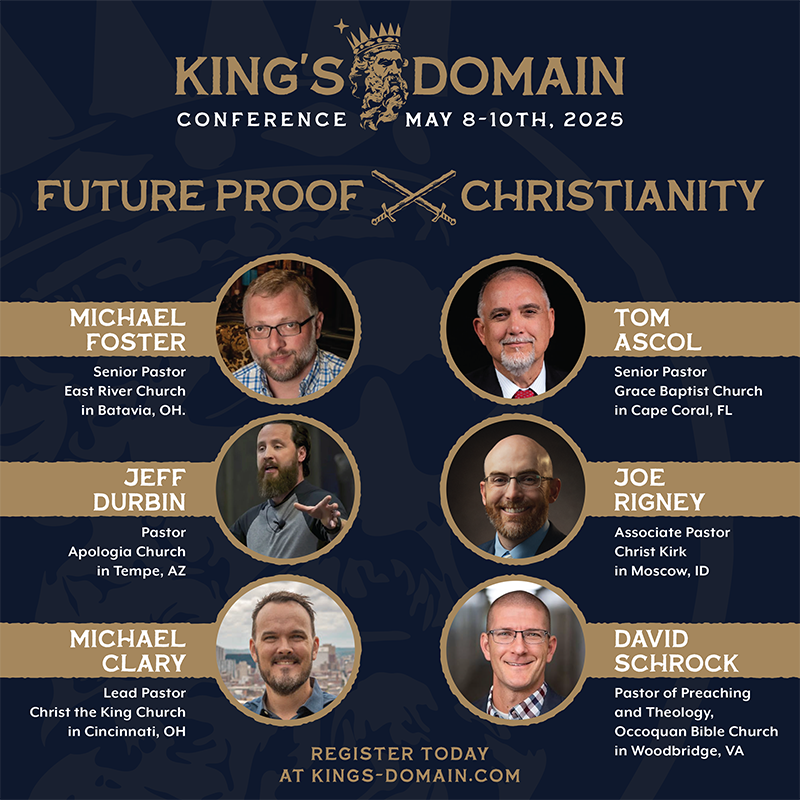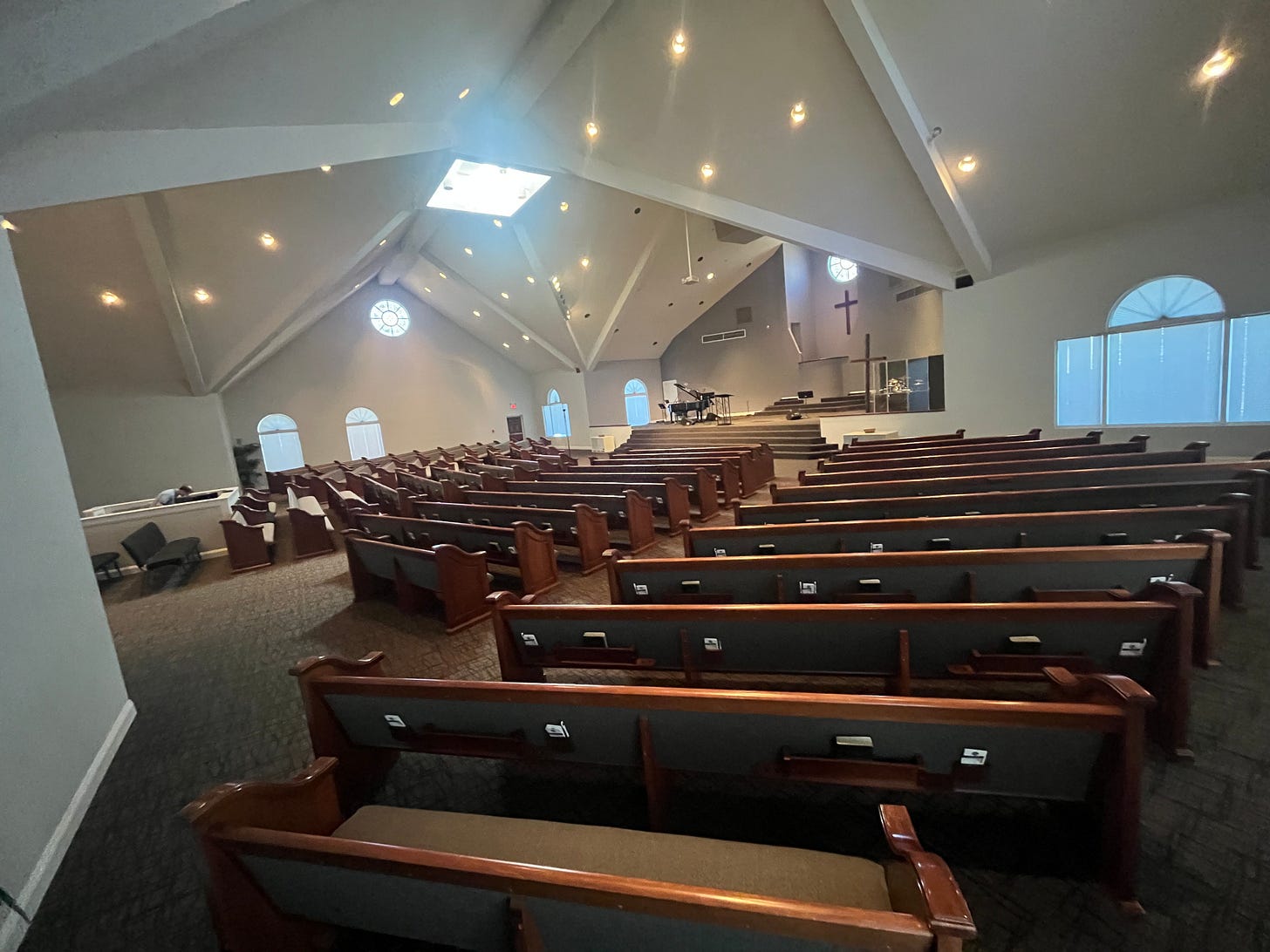It’s 2025: Time for Evangelicals to Ditch “Loser Theology” and Build to Win
The American Church Has Been Given Four Years of a Respite from the Progressive Onslaught. We Must Capitalize on the Moment with Bold Action and Agency.
(Here’s a republication of my latest piece for the Center for Baptist Theology).
On January 20th, 2025, Donald J. Trump was inaugurated as the 47th president of the United States. In a welcome departure from the previous administration, Trump is bringing outspoken conservative Christians into his administration, such as Pete Hegseth (Secretary of Defense), Marco Rubio (Secretary of State), Russ Vought (Director of OMB), Scott Turner (Secretary for HUD), John Ratcliffe (CIA Director), and more.
In a flurry of “Day One” activity, President Trump signed Executive Orders purging CRT and DEI from the federal workforce, defending the creation order reality of biological sex (male and female) from conception, and even shut down the HHS website dedicated to helping women kill their unborn children via abortion.
By God’s grace, the next four years will grant a reprieve from the absurd policies of President Biden and the progressive Democrats. This window will give conservative Christians an opportunity to assert the supremacy of Christ in the public square. If we steward this time well, we may witness real revival and reformation in the American church and our politics that bears fruit far beyond 2028.
There’s no question that “the vibe shift” has decidedly moved in a more conservative direction in our country. Trump alone didn’t cause the shift. But he is a major vessel and spokesman representing it. At the ground level, the shift belongs to the people who are and will be making it happen, including many Christians.
That is, as long as we can get out of our own way.
While I’m excited about the vibe shift and the prospects of flourishing under four years of a second Trump Administration, one of the biggest obstacles Christians must overcome to capitalize on this moment is what I call “loser theology.”
I’m currently writing a book on loser theology. But given the pressing need of this moment, I want to explain the basic idea in this article so you can start rejecting this poison now and aggressively “build to win” in your churches, communities, and country, to the glory of God, over the next four years.
The Soft Poison of Modern Christianity
In today’s Christian landscape, “loser theology” has become an unspoken yet pervasive undercurrent in many churches. It’s not something explicitly taught from the pulpit or codified in statements of faith. Instead, it’s absorbed passively, shaped by the cultural ethos of the church environment. In over two decades of ministry, I’ve seen this framework subtly yet profoundly affect countless sincere, Bible-believing Christians.
At its core, loser theology convinces believers that asserting agency for Christ is inherently wrong. It frames passivity, weakness, and vague trust in God as the hallmarks of true faithfulness, while strength, conviction, and action are branded as dangerous forms of legalism and pride.
This theology offers a spiritualized excuse for being ineffective, weak, and lazy men.
And, even worse, loser theology is how liberalism is marketed to Bible-believing, conservative Christians as the only “acceptable” framework for faith in the public square.
The Third-Way Trap
The messaging of loser theology typically positions the Christian life as a middle path between two extreme identities: the Prodigal Son and the Elder Brother. There are Prodigal Sons to the Left and Elder Brothers to the Right (I’m not breaking new ground here, just connecting the dots of winsome third-way-ism to loser theology).
Prodigal Son Christians are former rebels, partiers, and entitled brats who brazenly sinned against God in egregious ways. But at least they knew they were bad. They know how much they’ve been forgiven, so they comprehend God’s grace better and love better.
Elder Brother Christians are self-righteous legalists who are obsessed with following the rules. But they obeyed God with stony hearts and secretly despised him. They may be saved but they don’t really “get it.” As long as you avoid “The Big Sins” of the Left (drugs, sexual immorality, etc.), and the fundamentalist Phariseeism of the Right, you’ll be Ok. Just follow the gospel-centered “way of Jesus,” paved with service, sacrifice, humility, and neighbor love.
Since “The Big Sins” of the Prodigal are obviously wicked and harmful, we don’t need to talk about that very much. We can safely avoid that kind of “culture warring.” Rather, we must focus our ire on condemning the subtle sins of the conservative, Elder Brothers. They need more “air time” to be corrected properly since they’re less obvious.
In this paradigm, the “winsome middle” (aka slow-motion liberalism) becomes the only acceptable option. To avoid offending the potential “Prodigals,” Christians are told not to engage in the “culture war,” steering clear of confronting obvious societal evils. But greater sin is cast as the pride and rigidity of the Elder Brother, making conservative Christians the primary target for correction.
To avoid “Elder Brotherism,” one must not assert himself too much, lest he be enamored with power and become an oppressor.
One must not be too strong, lest he take pride in his strength and forget the Lord.
One must not love his own family or people too much, lest he fail to recognize the global implications of the gospel.
One must not acquire too much wealth, lest his treasures on earth lead his heart astray.
One must not care too much about doctrinal precision, lest he become a Pharisaical “Theo Bro.”
In fact, one must not desire anything too much, lest he make an idol of the object of his desire.
Loser theology is the outworking of this “middle way” impulse. The result? An aversion to strength, boldness, or any form of self-assertion. The message? The only faithful Christian is a passive Christian.
The Allure and Hypocrisy of Loser Theology
Loser theology is deceptively attractive because it replaces biblical virtues with pseudo-virtues. Powerlessness, poverty, weakness, insecurity, and even globalism (i.e., anti-patriotism) are elevated as true marks of holiness. These qualities conveniently lock Christians in a state of permanent ineffectiveness while cloaking that failure in a false sense of moral superiority.
These pseudo-virtues are bundled together and marketed to conservative, Bible-believing Christians as the “Way of Jesus.” Even if they retain their conservative beliefs about morality and social issues, the “Way of Jesus” is to do nothing about it.
If they make any attempt to assert their Christian agency to push back on moral decay, they fail to follow the “Way of Jesus” and are no better than the moralizing Pharisees he condemned. These pseudo-virtues essentially privatize the Christian faith, rendering believers impotent for doing anything beyond the realm of their private devotional lives.
Yet the hypocrisy of loser theology is its most glaring flaw and its obvious tell. The proponents of loser theology condemn others for their “idolatry of power” while wielding institutional and rhetorical power to crush dissent. They criticize Christian men who are pursuing physical strength by hitting the weights, yet they exert their own kind of strength to suppress those who reject their ideology. They alone are able to determine the limits and uses of power.
Conservative Christians who strive for excellence, discipline, or masculine strength are vilified as “Christian Nationalists.” But when progressive Christians do it, it’s just “love for neighbor.”
At the end of the day, what these critics fear most is seeing others rise above the complacency and regime fealty that they’ve embraced.
Resentment and Change
No one likes being a loser, however, even if they feel like it’s their Christian duty to be one. So resentment easily develops towards those who are rejecting loser theology. When some Christians see other men rejecting loser theology, becoming more masculine, sharpening their minds, taking care of their bodies, and asserting themselves in the world, they see it as their prophetic duty to denounce those men.
They are not seen as men who simply want to pursue excellence in all areas of life. Rather, their pursuits are pathologized as psychological disorders.
The resentment bred by loser theology is palpable. Misery loves company, and those trapped in this mindset find comfort in shared weakness. When other Christians begin to reject passivity it triggers an almost reflexive hostility. Their growth is seen not as obedience to God but as a threat to the comfortable yet fragile status quo.
This thinking and behavior is all over the Christian world in every denomination and tradition. It needs to change.
A Call to Momentum
There are positive signs that this change is happening. Many Christians are awakening to the reality that loser theology has sold them a lie. Men and women are sick of being under the thumb of self-righteous, progressive tyrants who openly flaunt their high-handed contempt for God. Many Christians see the cultural insanity around them and recognize that we have an opportunity for Spirit-filled boldness. They are rediscovering the call to strength, leadership, and action for the glory of Christ.
Frankly, lots of men and women are sick of being Christian losers. They are realizing that, by God’s grace, a potential reprieve from crazy town is happening in our culture. There’s a new opportunity to assert our Spirit-filled Christian power in the world and make some noise for the glory of God.
I’m not calling for believers to abandon the essential virtues of humility, love, gentleness, sacrifice, and service. I’m calling for believers to understand these virtues rightly and apply them boldly to assert the supremacy of Christ in every area of life, both public and private.
I’m calling for us to recognize that God has given us a break from the oppressive insanity of progressivism. The wind is at our backs. We must seize the advantage.
Also, this movement away from loser theology isn’t about perfection or self-reliance. We’re not perfect. We all need grace for our weaknesses. None of us have “arrived.” But there’s a growing hunger among men and women to reject complacency and mediocrity. We’re embracing the power of the Spirit to transform our lives, families, and communities.
The question for us now is whether we will tear each other down or build each other up in this pursuit. Will we embrace the strength God has given us to fight for truth and goodness in a world that desperately needs both?
The time for loser theology is over. The time for Spirit-filled, Christ-exalting action is now.
Let’s keep the momentum going. Let’s build to win, for Christ the King and our country.
**I’m writing a book about Loser Theology that should be released later this year or early next year that will develop these concepts further.
Future Proof Christianity Conference
We’ve got a stellar lineup of speakers for the Future Proof Christianity conference sponsored by King’s Domain. You’ll hear keynote addresses from Jeff Durbin, Roe Rigney, Tom Ascol, Michael Foster, David Schrock, and Michael Clary.
New Speaker Added!
And now, I’m excited to announce that C. R. Wiley, author of “The Household and the War for the Cosmos” and “In the House of Tom Bombadil,” has been added to the speaker lineup.

Honestly, I was kicking myself for not inviting him sooner. Chris has been doing a lot of work helping Christians prepare for future technological advancements such as AI and transhumanism. So I thought to myself, “this is bigger than I’ve realized, and we need to talk about this at our conference.” I texted Chris, sheepishly asking if he’s consider coming, and he graciously accepted.
(Don’t be surprised if we add a women’s breakout speaker too!)
New Location!
Here’s another thing. Our previous two conferences were held at our inner-city church in Cincinnati, OH. Small building, limited options, terrible parking, etc.
But two weeks ago, our church finalized the purchase of a new building, 10 minutes away, across the river in northern KY. This building is about three times the size of our old building.
Our new building is:
Easily accessible for both OH and KY residents
Close to the highway
Close to the Cincinnati airport (CVG)
Has lots of parking
Has a large, beautiful sanctuary
Has plenty of “hang out” spaces where people can connect with other like-minded believers
Has lots of classrooms where we can easily host breakout sessions
Has a commercial kitchen and fellowship hall where we can provide meals onsite
Some more conference details:
Website: www.futureproofchristianity.com
Dates: May 8-10, 2025
Speakers: Tom Ascol, Jeff Durbin, Joe Rigney, C. R. Wiley, Michael Foster, David Schrock, and Michael Clary
Location: Christ the King Church (638 Highland Avenue, Ft. Thomas, KY 41075)
Cost: $120 (early bird pricing is $110 through the end of February).
I’d love to personally invite all readers of this newsletter to come and join us this year!
(For sponsorship options, send us an email and we’ll get you more info!)







A great diagnosis of the times. I love the characterization of the elder brother. It will be tempting to generalize, yet it’s helpful to start conversations. I love the specifics that follow about third way ism and the passive cultures. More concrete ways to identify that and drawing that out will be helpful in the book.
This is why we started Christ the King . build in Stillwater Minnesota. Finding out that your church was named the same just sealed the deal for us. ;-) Godspeed! Let’s go build!
Good stuff Michael!! The time is now for the church.